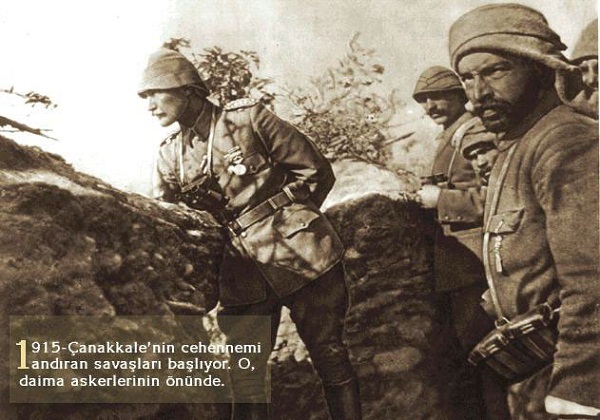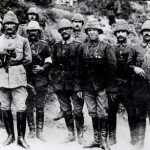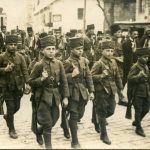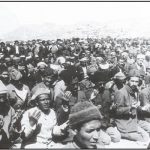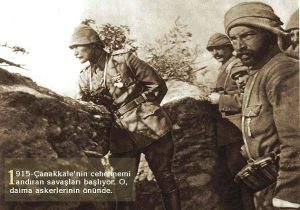 This year, the month of June is the 100th anniversary of the beginning of World War I. It also marked the final stage in the demise of the Ottoman Empire. After four years of misery, deprivation, slaughter and ruin the war came to an end on November 11, 1918. The Ottoman Empire was defeated by the Entente Powers (England, Russia and France), and surrendered on October 30, 1918, and ceased de facto to exist.
This year, the month of June is the 100th anniversary of the beginning of World War I. It also marked the final stage in the demise of the Ottoman Empire. After four years of misery, deprivation, slaughter and ruin the war came to an end on November 11, 1918. The Ottoman Empire was defeated by the Entente Powers (England, Russia and France), and surrendered on October 30, 1918, and ceased de facto to exist.
First, a brief overview of the dismal conditions that prevailed in the country at that time:
For a long time prior to the WWI, the Ottoman Empire had already been in the throes of a steep decline at the hands of ignorant, incapable and visionless rulers. They involved the country in endless wars; this adventurism coupled with poverty, misery, and the stifling influence of Islam buried the Empire in the pitch dark. The ruling class was careless and completely detached from the nation. They provided no education, no health care, and no infrastructures. There was no factory, no skilled workers, and no businessmen; therefore there were no productions whatsoever. The sultans, one after another, cared only for their thrones and the hedonistic life in the Harem. Once a sprawling Empire, it had turned into a rudderless ship tossed about aimlessly in a rough sea.
When the WWI broke out in August 1914 The Ottoman Empire had just come out of two long, attritional wars, the Balkan Wars (1912-1913 and 1913). These wars turned disastrous for the Ottomans; they lost 83% of their land in Europe and 69% of their population in the Balkans. The Country was in no condition to support any major military adventure so soon after two catastrophic wars. The population was decimated severely, the economy was in ruin, and the Armed Forces were beaten and exhausted. Lack of leadership, severe losses, diseases, poor logistics and the stringency of supplies encumbered their fighting capability. Food, clothing, boots, ammunition were frightfully scarce. The soldiers were often bare-footed, rugged and hungry. The collective morale in the country was very low. Under the circumstances even to consider a war was insane. Yet, the fate of the country was in the hands of a small clique of incapacitated people, painfully ignorant, foolish, and a toy at the hands of foreign powers.
Despite all these unfavourable circumstances, the Germans created a fait-accompli to drag the Ottoman Empire into that conflagration on their sides even against the overwhelming popular will in the country. A conspiracy by the German High Command in collaboration with the German Admiralty was underway. Two German warships were used as a powerful instrument; and a patriot, Admiral Wilhelm Souchon the Commander of the Mediterranean Squadron, was their point-man in the field.
After the humiliating defeat in the Balkan Wars, Turkey needed to strengthen its Navy and placed an order with England to have two battleships built at an exorbitant price. The funds had been raised by popular subscriptions. People from all walks of life contributed generously. Those magnificent ironclad battleships were to be named “Sultan Osman” and “Reshadiye”, two major additions to the Ottoman Naval Forces. Sultan Osman was intended to be the most heavily armed battleship in the world at that time..
However, when the dark clouds of war appeared on the horizon the British seemed to have had some ulterior design on those ships. In fact, “Sultan Osman” had been completed on May 1914, and to bring it home a Turkish crew had been dispatched to London. Yet, the British claimed that based on the intelligence gathered from reliable sources the Greeks had been planning to carry out a submarine attack on this ship on its way home; thus they persuaded the Ottoman government to leave her in Britain until her sister ship “Reshadiye” was completed. Then, the British reasoned, these two ships could sail together more safely. In early July “Reshadiye” was also ready, yet the British kept stalling their departures. On August 3, Winston Churchill, First Lord of Admiralty, suddenly announced that due to exigencies of the approaching war the two Turkish warships had to be commandeered by the British government. On the same day, the Foreign Secretary Sir Edward Gray sent a telegram to the Porte and informed the Government that Great Britain had found it necessary to retain the ships for her own needs in the imminent crisis. They were renamed “Erin” and “Agincourt” and became parts of the British Fleet. There was no mention of any kind of compensation whatsoever. The anger and deception caused by England in Turkey were overwhelming.
From the Turkish perspective, the timing of the British action was very unfortunate as it sealed the fate of Turkey; furthermore, it provided a strong argument for Germany who claimed that the British were perfidious and unreliable. So, the Germans used this much-needed leverage to sway the Turkish decision-makers to their side. Indeed, on August 2, 1914, the Turks signed a Treaty of Alliance with Germany. The Turkish High-Command was under the spell of Germany. They blindly followed whatever the Germans dictated to them and let the Germans use them for their own sake.
At that time Admiral Souchon was in the Western Mediterranean with a mission to disrupt the French colonial troop transport from North Africa to France. These 80,000-strong colonial troops were on the war-footing, waiting to be carried to France. This was a sizeable striking force for the Entente Powers; therefore, the French and the British fleets were also in the area with a primary task of safeguarding the free passage of the troops. Under the command of Admiral Souchon were two cruisers of the German Mediterranean Squadron. A battlecruiser SMS Goeben, 22,640 tons, capable of 28 knots; and a light-cruiser Breslau, 4,500 tons with a similar speed.
On August 2, the following wireless message from German Admiralty reached Souchon:
“Alliance with Turkey concluded August 2. Proceed at once to Constantinople.”
Even though Turkey had signed an Alliance with Germany she did not declare war on Russia and refused to take any action publicly compromising her neutrality. Yet, for Germany, it was vital to bottle up Russia in the Black Sea. Everybody but Enver Pasha, the Minister of War, in the Turkish government was for prudence for any overt act against Russia until the progress of the war revealed some sign of its possible outcome.
On August 3, Admiral Souchon bombarded the French bases in North Africa and then fled into the Eastern Mediterranean with the British Navy in hot pursuit. Souchon was counting on taking refuge in the Turkish waters. He was determined to exert pressure on the reluctant Turks to have them declare war on the Allies (Russia, Britain and France). Souchon was an independent-minded person with courage of his own conviction. His plan was to spread the war single-handedly to the Black Sea and embroil the Turks, even against their will, in a conflict with Russia. On August 11, these two battleships entered the Dardanelles, Enver Pasha arranged for them to pass into the Ottoman territorial waters. They were transferred to the Ottoman Navy by a fictitious sale and given the names Yavuz Sultan Selim and Midilli, and they flew Turkish flag. Admiral Souchon was made the Commander of the Ottoman Black Sea Fleet. The German sailors were given fezzes and Ottoman uniform and enlisted into the Turkish Navy.
The days passed without any action on the part of the Turks. The Germans became frustrated with these vacillations of the Ottomans. After 11 weeks of Turkish indolence, the Germans decided to carry out their master plan. On October 29 Admiral Souchon was given authorization to take Goeben and Breslau to the Black Sea accompanied by the ragtag Turkish torpedo boats. They shelled Odesa, Sebastopol, Novorossisk and Feodosia causing some civilian loss of life and sinking a Russian gunboat. This act of war having been committed in the name of Turkey, on November 2, Russia declared war on Turkey. Britain and France followed suit two days later.
In that war, Turkey fought in five fronts. On the Eastern Anatolia she fought the Russians (Sarıkamış disaster!) and Armenia, on the West, in Galicia, jointly with the Austrians she fought the Russians; on the South Eastern Anatolia (Urfa, Mardin, Maraş and Adana) with the French; in the Eastern Anatolia and Syrian Front and in Suez Canal zone with the British, and in Dardanelles she fought the combined force of the British, French, Australian and the New Zealanders.
The Sarıkamış disaster is a text-book example of what would befall a country if its High-command lacks foresight and good judgment. The biggest misfortune for the Ottomans at that time was to be ruled by Sultan Vahdettin, not only inept and foolish but a traitor as well. His Minister of War, Enver Pasha, was an adventurer with limited capacity. Yet, he was grandiose in nature, and was referred to in the West ironically as “Generalissimo”. This idiotic man engaged in a senseless campaign against Russia – in January 1918!! at a temperature of – 40 degree and at an elevation of 6,500 feet (more than 2,000 meters) The days were short, and the nights were much colder, there was no heat, no adequate clothing, and the food was skimpy. The bitter cold and the unrelenting snowstorms paralyzed the Turkish Army. They became confused and disoriented. They were stuck in heavy snow and were unable to move their equipment. They were struggling to survive, much less fighting. One division lost 4,000 of its 8, 000 men to frostbite in four days. On December 29, 1914, the Russians attacked at Sarıkamış, near Kars, and routed the Turkish forces. On January 2, the whole of the Turkish IX Corps surrendered. In mid-January, only 18,000 survived out of 95,000 Turkish soldiers. 30,000 are said to have died of cold. Typhus and dysentery also took their tolls. After so many colossal blunders in his record,
In 1918 this pathetic man, Enver Pasha, fled Turkey in a German submarine. Some patriot!!
In retrospect, the WW I was the biggest disaster that befell the Ottoman Empire in its long history. Had the voyage of Goeben and Breslau not been successful the Ottoman Empire possibly would not have entered the war, and three million Turks would not have perished. Also, the war could have ended sooner than it did, because the Turkish neutrality would have enabled Russia and England to concentrate on Germany and Austria more effectively.
The Ottoman defeat at the WW I brought several pestering issues in its wake. Chief among them is the Armenian problem. In 1878, The Ottomans lost several vassal states in Europe and in the Balkans. Greece (1821), Romania, Serbia (1813), Bosnia-Herzegovina had won their independence from the Ottoman Empire. Around that time the Armenian minority turned restless under the Ottoman rule. While the other vassal states gained their independence one after another they felt they too were entitled to establish their own state within the Ottoman realm. To accomplish this goal they resorted to terrorism, rebellions, treason, insurrections within the country, even in an unprecedented betrayal they collaborated with the enemy when Turkey was in a life-and-death struggle with Russia. Today, a hundred years later the Turkish-Armenian relations are still strained.
In the same vein, the Arabs had been long under Turkish domination. As the Ottomans weakened and lost almost all the recent wars the Arabs became defiant. Two years into the war the British were successful to lure them to revolt. The British gold, weapons and the empty promises did the trick. With the guidance of a shrewd operator, Lawrence of Arabia (his historical name) they revolted on June 5, 1916, which led them to independence from the Ottomans. The Ottomans suffered a humiliating defeat and lost its oil-rich southern provinces, which accelerated its disintegration.
Another important loss for the Ottomans was the island of Cyprus. The British grabbed it in this turmoil. This island, only 40 miles away from the mainland Turkey, had been in the possession of Turkey for almost 350 years; today hundred years later, it is still a bleeding wound in the Eastern Mediterranean…
The First World War was a tragic and unnecessary conflict. Unnecessary, because had prudence or common good-will prevailed the course of events that led to its outbreak might have been diverted at any point during the five weeks of crisis that preceded the first clash of arms.
Tragic, because in this war 10 million human beings perished.
The Second World War that broke out in September 1939 was five times more destructive of human life and incalculably more costly in material terms, and it was a settling of the accounts of the First World One.

